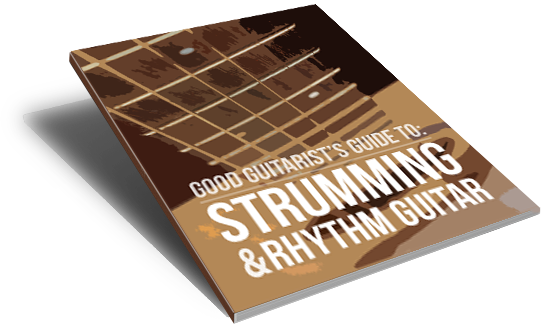5 Beginner Guitar Strumming Tips That Actually Work
Discover 5 essential strumming tips for beginner guitarists to improve rhythm, feel, and technique. Includes easy practice tips and free resources to level up your playing.
Hey, it’s James here from goodguitarist.com! In today’s lesson, I want to share five practical tips that will improve your strumming and help you feel more connected to the beat, so your playing becomes smooth, confident, and automatic.
🎸 Tip #1: Mute the Strings While Practicing Strumming
When you practice strumming, you don’t need to hold down chords. In fact, keeping the same chord shape for too long can make your fingers sore without offering much benefit.
Try muting the strings with your fretting hand instead. It:
- Saves your fingers from unnecessary pain
- Produces a clearer, sharper percussive sound
- Makes it easier to hear whether your rhythm is tight and aligned with the beat
This is how I clean up my strumming technique – by focusing on rhythm without worrying about chords.
💪 Tip #2: It’s More Than Just a Loose Wrist
People say “just loosen your wrist” but that’s only part of the story.
Strumming actually involves your whole arm:
- Forearm rotation is the main driver
- Your wrist reacts to the forearm
- Elbow and shoulder provide support
- Fingers and thumb help angle the pick for a smoother sound
A good strumming motion is a fluid combination of these. Try holding your arm in position and rotating your forearm to see how it naturally flicks your wrist. That’s the movement we’re aiming for.
🎯 Tip #3: Loosen Your Grip on the Pick
If you hold your pick too tight, your strumming will sound harsh and clunky. Instead, imagine your pick is a paintbrush. You’re just brushing the strings gently.
✅ Use a light, controlled grip
✅ Let the pick flow through the strings
✅ Practice slow, smooth down-up motions
And don’t worry if you drop a pick – that’s normal! Even pro guitarists have extra picks taped to their mic stands for this reason.
🔁 Tip #4: Use Continuous Arm Motion
Here’s one of the most important habits to develop:
Your strumming arm should always be moving down-up like a pendulum, even if you’re not hitting the strings on every beat.
This “ghost strumming” keeps your rhythm consistent and makes it way easier to stay in time. Downstrokes line up with the numbers (1, 2, 3, 4), upstrokes with the “ands” (1 and 2 and…).
Watch live footage of pros like Peter Frampton playing acoustic – their arms never stop moving!
⚡ Tip #5: Add More Velocity to Your Strumming
Beginners often don’t strum through the strings fast enough, which creates a disconnected, “plucky” sound. We want the chord to ring out smoothly and evenly.
This ties all the other tips together:
- A loose grip on the pick
- Good arm mechanics
- Continuous motion
🎵 Try this simple drill:
- Set a metronome to 60 bpm
- Play downstrokes on just the numbers (1, 2, 3, 4)
- Then switch to eighth notes (1 + 2 + 3 + 4 +)
- Gradually increase the size and speed of your motion
Eventually, switch to full down-up strokes, maintaining that faster arm speed and smooth, connected sound.
Want to Go Deeper with Strumming?
If you’re still learning chords and building confidence with basic strumming, my Learn Guitar Once-and-For-All course will walk you through everything, step-by-step. It’s part of my All-Access Pass – your membership includes full courses, exclusive bonuses, and a private community to get feedback and stay motivated.
👉 Start your 10-day free trial of the All-Access Pass
Already good with chords but want to take your strumming further? Check out Strumming Made Simple – it’s all about playing and singing at the same time, adding cool percussive strumming tricks, and getting your 16th notes clean and tight.
Have a fun time practicing and I’ll see you soon!
– James
All-Access Pass
Start your 10-day FREE trial
- Step-By-Step Courses
- Exclusive YouTube Bonuses
- Q&A with James






